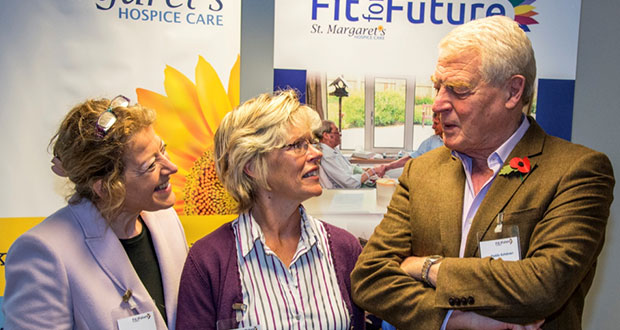Report Reveals Future Challenges For Delivery Of End Of Life Care
 A number of key challenges face the delivery of quality end of life care, including increased competition for funding and a need for better integration of healthcare services.
A number of key challenges face the delivery of quality end of life care, including increased competition for funding and a need for better integration of healthcare services.
According to a report by Somerset-based St. Margaret’s Hospice, sustaining and growing its workforce, including volunteers, as well as the growth in patients with complex needs such as dementia also needs to be urgently addressed.
It follows a six-month consultation process as part of the ‘Fit for Future’ review, which has been designed to look at the delivery of palliative care in the region, to identify better and more efficient care models that could be blueprints for the rest of the country.
‘Fit for Future’ has brought together leading healthcare experts, including patient representatives, to assess the action that is needed now to support palliative care provision in the future. It comes at a time when the county, and the UK, is facing up to the dual challenge of funding cuts and increasing health and social care needs as we live longer.
The report has recommended six areas that need to be addressed: finance and funding; rising demand, maintaining quality; fractured services; accessibility and equity of care and maintaining and growing the care community.
Not only is the number of people who need palliative care predicted to grow, it is becoming more complex with the prevalence of dementia and life limiting illnesses other than cancer. Lack of hospice beds and the rural nature of the county is also an issue, which will drive the need for more care in the community.
Ann Lee, Chief Executive, said: “In Somerset, our demographic suggests we will see a significant increase in the number of patients in need of palliative care above the current position of 5,000 a year, which is already a challenge.
“We also have one of the biggest ageing populations in the UK. In the next 15 years, it is predicted that, without reform to the way we do things, around 40% of the population will die alone without adequate care and support. This is a situation that will be reflected around the country.
“This interim report confirms that we have to take a new approach to delivering end of life care. The cost of our care is overtaking the volume of charitable income being generated, so we have to look at more creative and cohesive ways of delivering our care, in collaboration with the rest of the care community. This could be through the use of technology or pooling access to 24 hour care.
”Not only do we have a growing elderly population, it is becoming more diverse in its needs. We have identified a number of hard to reach social groups, as well as those living in rural locations, so we have to ensure there is equity in the delivery of care.
“And to do all this we need to sustain and grow our workforce, including the critical bank of volunteers.”
The report will now be subject to further consultation as the ‘Fit for Future’ review continues, with recommendations made to the Board of Trustees and practical care models piloted at the end of the year.





